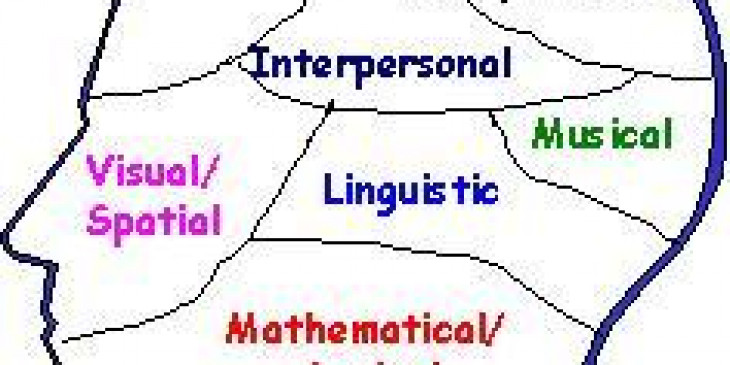Multiple Intelligence considers different intelligences and sensories insted of a specific Intelligence.
Following are the Gardner's Multiple Intelligences - descriptions, preferences, personal potential, related tasks and tests :
1. Linguistic
intelligence description : words and language, written and spoken; retention, interpretation and explanation of ideas and information via language, understands relationship between communication and meaning
typical roles, preferences, potential : writers, lawyers, journalists, speakers, trainers, copy-writers, English teachers, poets, editors, linguists, translators, PR consultants, media consultants, TV and radio presenters, voice-over artistes
related tasks, activities or tests : write a set of instructions; speak on a subject; edit a written piece or work; write a speech; commentate on an event; apply positive or negative 'spin' to a story
preferred learning style : words and language
2. Logical - mathmatical
intelligence description : logical thinking, detecting patterns, scientific reasoning and deduction; analyse problems, perform mathematical calculations, understands relationship between cause and effect towards a tangible outcome or result
typical roles, preferences, potential : scientists, engineers, computer experts, accountants, statisticians, researchers, analysts, traders, bankers bookmakers, insurance brokers, negotiators, deal-makers, trouble-shooters, directors
related tasks, activities or tests : perform a mental arithmetic calculation; create a process to measure something difficult; analyse how a machine works; create a process; devise a strategy to achieve an aim; assess the value of a business or a proposition
preferred learning style : numbers and logic
3. Musical
intelligence description : musical ability, awareness, appreciation and use of sound; recognition of tonal and rhythmic patterns, understands relationship between sound and feeling
typical roles, preferences, potential : musicians, singers, composers, DJ's, music producers, piano tuners, acoustic engineers, entertainers, party-planners, environment and noise advisors, voice coaches
related tasks, activities or tests : perform a musical piece; sing a song; review a musical work; coach someone to play a musical instrument; specify mood music for telephone systems and receptions
preferred learning style : music, sounds, rhythm
4. Bodily - Kinesthetic
intelligence description : body movement control, manual dexterity, physical agility and balance; eye and body coordination
typical roles, preferences, potential : dancers, demonstrators, actors, athletes, divers, sports-people, soldiers, fire-fighters, PTI's, performance artistes; ergonomists, osteopaths, fishermen, drivers, crafts-people; gardeners, chefs, acupuncturists, healers, adventurers
related tasks, activities or tests : juggle; demonstrate a sports technique; flip a beer-mat; create a mime to explain something; toss a pancake; fly a kite; coach workplace posture, assess work-station ergonomics
preferred learning style : physical experience and movement, touch and feel
5. Spatial - Visual
intelligence description : visual and spatial perception; interpretation and creation of visual images; pictorial imagination and expression; understands relationship between images and meanings, and between space and effect
typical roles, preferences, potential : artists, designers, cartoonists, story-boarders, architects, photographers, sculptors, town-planners, visionaries, inventors, engineers, cosmetics and beauty consultants
related tasks, activities or tests : design a costume; interpret a painting; create a room layout; create a corporate logo; design a building; pack a suitcase or the boot of a car
preferred learning style : pictures, shapes, images, 3D space
6. Interpersonal
intelligence description : perception of other people's feelings; ability to relate to others; interpretation of behaviour and communications; understands the relationships between people and their situations, including other people
typical roles, preferences, potential : therapists, HR professionals, mediators, leaders, counsellors, politicians, educators, sales-people, clergy, psychologists, teachers, doctors, healers, organisers, carers, advertising professionals, coaches and mentors; (there is clear association between this type of intelligence and what is now termed 'Emotional Intelligence' or EQ)
related tasks, activities or tests : interpret moods from facial expressions; demonstrate feelings through body language; affect the feelings of others in a planned way; coach or counsel another person
preferred learning style : human contact, communications, cooperation, teamwork
7. Intrapersonal
intelligence description : self-awareness, personal cognisance, personal objectivity, the capability to understand oneself, one's relationship to others and the world, and one's own need for, and reaction to change
typical roles, preferences, potential : arguably anyone who is self-aware and involved in the process of changing personal thoughts, beliefs and behaviour in relation to their situation, other people, their purpose and aims - in this respect there is a similarity to Maslow's Self-Actualisation level, and again there is clear association between this type of intelligence and what is now termed 'Emotional Intelligence' or EQ
related tasks, activities or tests : consider and decide one's own aims and personal changes required to achieve them (not necessarily reveal this to others); consider one's own 'Johari Window', and decide options for development; consider and decide one's own position in relation to the Emotional Intelligence model
preferred learning style : self-reflection, self-discovery



Leave a Comment
To post comment, please